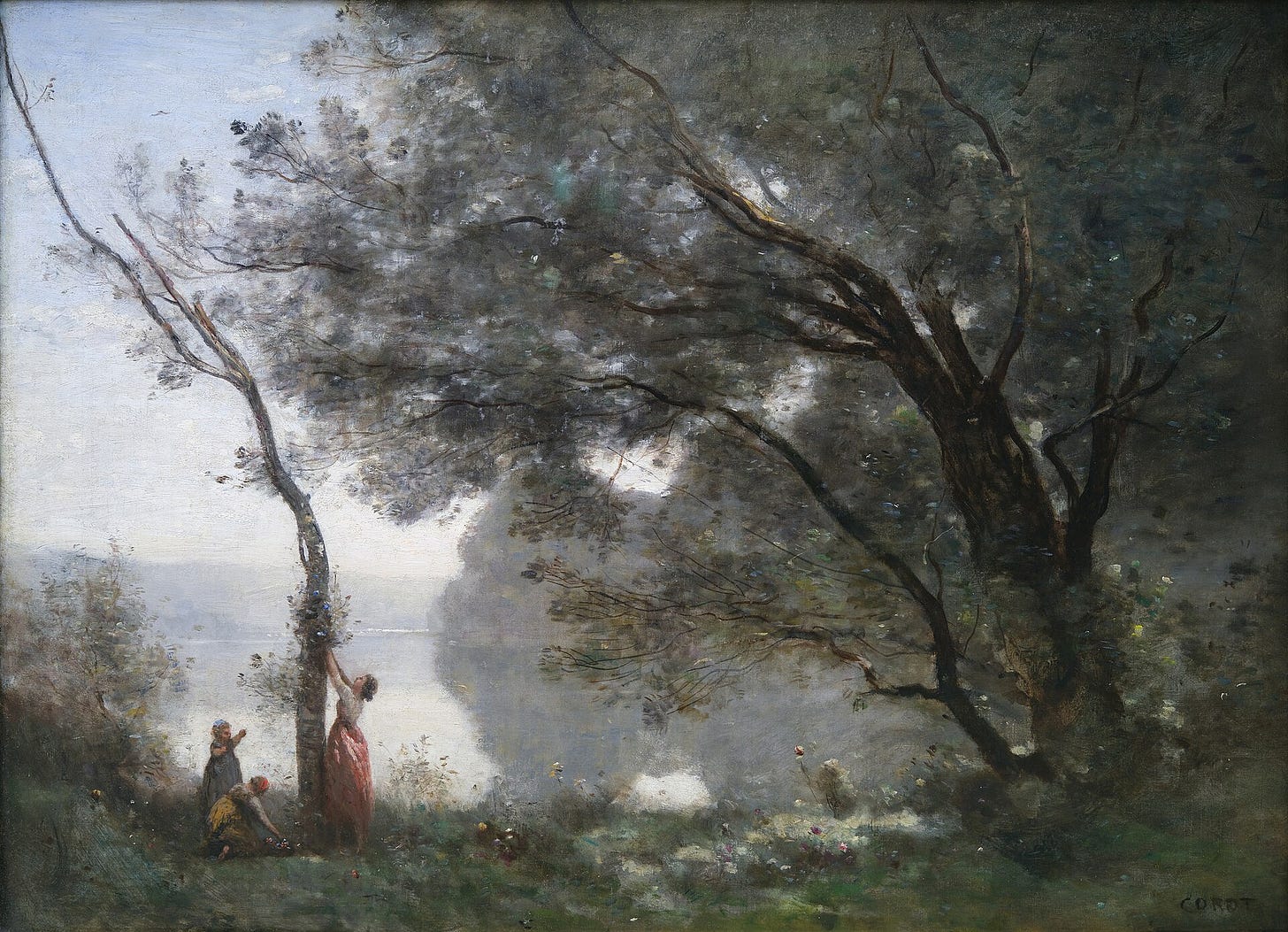5 expressions françaises intraduisibles… mais que vous allez adorer
Ever felt something you couldn’t name? French might have the perfect word.
There are some feelings that English just can’t quite capture.
The quiet joy of reuniting with someone you’ve missed.
The strange pull you feel when standing at the edge of a cliff.
The peace of wandering through a city with no destination.
French has words for all of these.
I picked 5 of my favorites. They’re beautiful, emotional, and I think you’ll want to use them too.
Jean-Baptiste Camille Corot. Souvenir de Mortefontaine (1864). Musée du Louvre.
English traduction at the end of the article
Le français a parfois des mots qui expriment une émotion ou une sensation avec une telle précision… qu’il est presque impossible de les traduire en un seul mot en anglais. Il faut souvent toute une phrase pour expliquer ce que signifie une simple expression française.
Voici 5 expressions françaises magnifiques et (presque) intraduisibles, à découvrir et à utiliser sans modération :
1. Dépaysement
Ce sentiment de décalage quand on se retrouve dans un environnement complètement différent : géographiquement, culturellement ou émotionnellement.
L’anglais propose “culture shock”, mais ce terme est souvent plus négatif, plus fort.
Dépaysement est plus subtil : cela peut être déroutant, mais aussi enrichissant, apaisant, curieux.
C’est une sensation que l’on ressent lorsqu’on quitte ses repères habituels.
Exemples :
“En arrivant au Maroc, j’ai ressenti un vrai dépaysement.” (When I arrived in Morocco, I felt a real sense of disorientation and wonder.)
“Le dépaysement est parfois exactement ce dont on a besoin.” (Sometimes, a complete change of scenery is exactly what we need.)
2. En avoir Ras-le-bol
Littéralement : “le bol est plein.” En d’autres termes : j’en ai marre.
En anglais, on peut dire “I’m fed up” ou “I’ve had enough”, mais il n’existe pas de formule aussi imagée et expressive que ras-le-bol.
C’est court, familier, et très chargé en émotion. On le dit quand on est à bout, quand on n’en peut plus.
Exemples :
“J’en ai ras-le-bol de faire toujours la même chose.” (I’m sick of doing the same thing all the time.)
“Les gens en ont ras-le-bol des promesses non tenues.” (People are fed up with broken promises.)
⚠️ Expression très courante, mais à utiliser dans un registre familier (amis, proches, etc.).
3. Flâner
Se promener sans but précis, juste pour profiter de l’instant.
On pourrait dire “to wander” ou “to stroll”, mais ces verbes n’ont pas la dimension culturelle et poétique de flâner.
Ce verbe évoque une manière de vivre : prendre son temps, observer, sentir l’ambiance d’un lieu. Pas de pression, pas d’objectif.
Exemples :
“J’adore flâner dans les petites rues le dimanche matin.” (I love wandering through little streets on Sunday mornings.)
“On peut flâner pendant des heures à Paris sans jamais s’ennuyer.” (You can stroll for hours in Paris and never get bored.)
4. Retrouvailles
Le bonheur de retrouver quelqu’un après une longue séparation.
Le mot anglais “reunion” existe, mais il est plus neutre, parfois même un peu administratif (school reunion).
Retrouvailles met l’accent sur l’émotion, la joie, l’intimité du moment où l’on se retrouve après s’être quittés.
Exemples :
“Les retrouvailles avec mes amis d’enfance étaient tellement émouvantes.” (The reunion with my childhood friends was so moving.)
“Après des années, nos retrouvailles ont été magiques.” (After years, our reunion was magical.)
5. L’appel du vide
Littéralement : “the call of the void”.
Cette expression poétique décrit cette pulsion étrange et brève que l’on peut ressentir : sauter dans le vide, faire un geste absurde ou dangereux, sans en avoir envie réellement.
Ce n’est pas un désir de mourir, mais une pensée étrange, furtive, inexplicable.
L’anglais ne propose pas d’équivalent direct.
Exemples :
“Quand je suis au bord d’un précipice, je ressens parfois l’appel du vide.” (When I look out the window at the top of the cliff, I sometimes feel the call of the void.)
“L’appel du vide est un phénomène fascinant et effrayant.” (The call of the void is a fascinating and frightening phenomenon.)
Et vous, quelle expression vous parle le plus ?
Est-ce que vous ressentez parfois du dépaysement ?
Vous avez ras-le-bol de quelque chose ?
Vous rêvez de retrouvailles ou vous aimez juste flâner ?
Peut-être que vous avez déjà ressenti l’appel du vide sans savoir que ça avait un nom ?
Dites-le-moi en commentaire, en français si vous voulez relever le défi !
Timothée,
English traduction :
French sometimes has words that express a feeling or sensation with such precision… that it’s almost impossible to translate them into a single word in English.
You often need a full sentence to explain what a simple French expression means.
Here are 5 beautiful and (almost) untranslatable French expressions, to discover and use without moderation:
1. Dépaysement
Dépaysement : That feeling of disorientation when you find yourself in a completely different environment — geographically, culturally, or emotionally.
English has “culture shock,” but that’s often stronger and more negative.
Dépaysement is more subtle: it can be confusing, but also enriching, calming, or curious.
It’s the sensation you feel when you leave your usual surroundings.
Examples:
“En arrivant au Maroc, j’ai ressenti un vrai dépaysement.”
→ When I arrived in Morocco, I felt a real sense of disorientation and wonder.“Le dépaysement est parfois exactement ce dont on a besoin.”
→ Sometimes, a complete change of scenery is exactly what we need.
2. En avoir ras-le-bol
En avoir ras-le-bol: “the bowl is full.” In other words: I’ve had enough.
In English, you can say “I’m fed up” or “I’ve had enough,” but nothing quite captures the imagery and emotional weight of ras-le-bol.
It’s short, informal, and very expressive, used when you're at your limit.
Examples:
“J’en ai ras-le-bol de faire toujours la même chose.”
→ I’m sick of doing the same thing all the time.“Les gens en ont ras-le-bol des promesses non tenues.”
→ People are fed up with broken promises.
⚠️ This expression is very common, but informal — best used with friends or people close to you.
3. Flâner
Flâner : To walk with no specific goal, just to enjoy the moment.
You could say “to wander” or “to stroll,” but these lack the poetic and cultural weight of flâner.
It suggests a way of life: taking your time, observing, soaking in the atmosphere. No pressure, no destination.
Examples:
“J’adore flâner dans les petites rues le dimanche matin.”
→ I love wandering through little streets on Sunday mornings.“On peut flâner pendant des heures à Paris sans jamais s’ennuyer.”
→ You can stroll for hours in Paris and never get bored.
4. Retrouvailles
Retrouvailles : The joy of reuniting with someone after a long separation.
English has the word “reunion,” but it’s more neutral, sometimes even administrative (school reunion).
Retrouvailles highlights the emotion, joy, and intimacy of finding someone again.
Examples:
“Les retrouvailles avec mes amis d’enfance étaient tellement émouvantes.”
→ The reunion with my childhood friends was so moving.“Après des années, nos retrouvailles ont été magiques.”
→ After years, our reunion was magical.
5. L’appel du vide
Literally: “the call of the void.”
L’appel du vide : This poetic expression describes that strange, fleeting urge to jump into the void or do something irrational or dangerous, without actually wanting to die.
It’s not a suicidal thought, but a sudden, unexplained impulse.
There’s no true equivalent in English.
Examples:
“Quand je suis au bord d’un précipice, je ressens parfois l’appel du vide.”
→ When I look out the window at the top of the cliff, I sometimes feel the call of the void.“L’appel du vide est un phénomène fascinant et effrayant.”
→ The call of the void is a fascinating and frightening phenomenon.
And you — which expression speaks to you the most?
Have you ever felt dépaysement?
Are you ras-le-bol of something lately?
Dreaming of retrouvailles, or just in the mood to flâner?
Maybe you’ve already felt l’appel du vide without knowing it had a name?
Tell me in the comments, in French if you’re up for the challenge!





Why say something is untranslatable, when all you mean is that there isn’t a one-word equivalent, or that in another language, different imagery is used to convey the same feeling? This is not untranslatability. When translators come across such terms, they create difficulties, it’s true, but there are plenty of strategies for dealing with them. For l’appel du vide, we might just say the urge to jump. Same feeling, different way of conveying it.
“C’est de la foutaisse totale”= un de très grande utilité